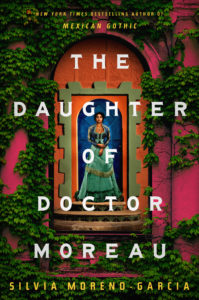
After merely enjoying Mexican Gothic while so many of my bookish friends were totally enamored, I figured it’d take a bigger push for me to pick up Silvia Moreno-Garcia again. That push came in the form of The Daughter of Doctor Moreau appearing on the shortlist for the Hugo Award for Best Novel, and I’m immensely glad it did.
The Daughter of Doctor Moreau is something of a retelling of the H.G. Wells classic The Island of Doctor Moreau, with several characters in common despite the setting being shifted to the 19th century Yucatán. But I have been told it comes off more as a riff—complete with an entirely new central character—than a retelling, and I personally didn’t feel I was missing anything due to not having read the original. That new central character is Carlota, the titular daughter of Doctor Moreau, a sheltered beauty growing up amongst the human/animal hybrids her father is making to supply his financial backer with field workers. As anyone familiar with sheltered beauties in period pieces may expect, a suitor soon comes, and chaos ensues.
The “sheltered beauty catches the fancy of a dashing but selfish heir” storyline isn’t especially new, although it’s one you may not see in science fiction as often as in other genres. But even if experienced readers will be able to predict major plot beats, the details are wrought so skillfully as to make for a gripping read. The descriptions may not have the creeping dread of Mexican Gothic, but they still make for a lush and vibrant setting. The two main characters—the naive, good-hearted Carlota and the estate’s world-weary, alcoholic mayordomo—come to life in a way that makes them both interesting and easy to cheer for. Even when I could see a romantic train wreck coming, I deeply wished it could be otherwise. And the hybrids add a substantial wrinkle beyond the basic period drama, with twin pressures provided by their own dissatisfaction and Doctor Moreau’s benefactor increasingly considering them a failed investment. There will be conflict, the only question is the form it will take.
And when all those conflicts come to a head, it makes for a genuinely exciting finish, with plenty of character drama and enough uncertainty to keep the pages turning. From a purely character and plot perspective, it’s undoubtedly a good read. But I found one of the most intriguing elements to be the way the book handled religion. The parallels between the hybrids and humanity writ large were clear enough. Doctor Moreau struck a godlike figure on the estate, and he plowed forward with his creations even knowing they would suffer. The book doesn’t offer many explicit answers, but it makes a compelling small-scale restatement of the philosophical and theological problem of evil.
But perhaps even more interesting to me was the different perspectives on religion between Carlota and her father. The second perspective character is an atheist, which seems relatively standard in contemporary SFF. But Carlota is a devout believer, and when she sees her father quoting Scripture out of context as a way of controlling the hybrids, she not only challenges him, she brings her own biblical receipts. It’s a common historical dynamic—in which those in power use religion as a mechanism of control, but those being controlled find something more genuine and expansive than their masters let on—that I don’t see too often in contemporary fiction, and I appreciated seeing it here. The events of the story force plenty of hard questions onto Carlota, and it’s not entirely clear just how her beliefs shift as the story goes on, but it was interesting reading a lead character who viewed the supernatural so differently than your standard sci-fi protagonist.
On the whole, there was plenty to like about The Daughter of Doctor Moreau, and I’m glad the Hugos pushed Moreno-Garcia’s work back into my hands. In fact, I’m beginning to wonder whether my tepid reaction to Mexican Gothic was tied more to my struggles with audiobooks than to anything in the storytelling. In many ways, this wasn’t a story breaking new ground, but I found it fascinating from a thematic perspective, the descriptions were lovely, and the characters were excellent. All told, it made for an excellent read.
Recommended if you like: period dramas with sci-fi twists.
Can I use it for Bingo? It’s hard mode for Title with a Title and Myths and Retellings and is also a Book Club selection by a POC Author that includes Mundane Jobs.
Overall rating: 17 of Tar Vol’s 20. Five stars on Goodreads.
